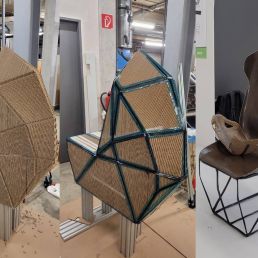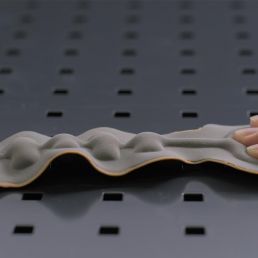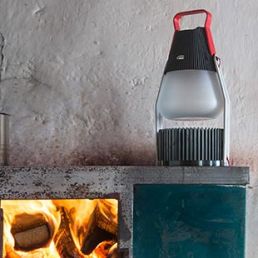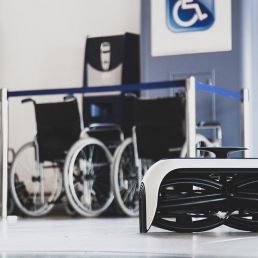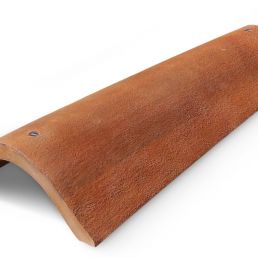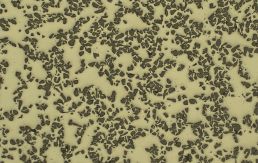
Brake disc with reduced fine dust
Triboconditioning reduces particle abrasion in road and rail traffic
22 April 2021
Tougher exhaust standards and the use of modern particulate filters have effectively reduced emissions from internal combustion engines, and with increasing e-mobility, fewer exhaust pollutants are being released into the environment. What remains is particulate pollution from the abrasion of tyres and brakes in road and rail traffic. With technologies from Sigma Materials and Applied Nano Surfaces, at least brake dust emissions can be sustainably reduced.
Health hazards from brake wear
When cars stop at traffic lights or a train stops at the platform, the brakes have to cope with enormous loads. As sophisticated as modern braking systems have become, however, most systems are still based on discs made of grey cast iron, which wear out through abrasion and have to be replaced regularly. In the past, this was more or less taken note of and hardly anyone paid attention to the question of where the abraded metal particles ultimately remain. However, with advances in analytical technology and a growing awareness of the potential health hazards of particulate matter, brake abrasion is now coming more and more into focus.
The attention of environmental researchers and health experts is focused in particular on particles with a diameter of less than 10 micrometres, officially referred to as “fine dust”, and even more so on particles with diameters below 2.5 micrometres, which can penetrate deep into the respiratory tract and cause lasting damage to the lungs and other organs. It is now clear that brake abrasion contains a high proportion of such particles. The State Institute for the Environment, Measurements and Nature Conservation Baden-Württemberg (LUBW) puts the annual brake dust emission for Germany from road traffic alone at 14,000 tonnes. As if that were not enough, brake dust contains particles of metals such as copper, iron or even antimony, which in turn can cause damage to health, the extent of which is still largely unexplored. Meanwhile, brake dust continues to be deposited along roads and railways, is stirred up as vehicles pass by and enters the air we breathe everywhere in densely populated areas.
95 percent less particle emissions
Wherever the principle of a disc brake is used, the abrasion of the finest particles can hardly be completely prevented: The braking process releases mechanical forces on the surface of the discs and generates heat, and friction repeatedly tears individual particles out of the material structures. However, the extent of the abrasion can be influenced, for example by coating the basic metal structure with wear-resistant materials such as tungsten carbide. With the triboconditioning developed by Applied Nano Surfaces (ANS), brake abrasion can be reduced even further: In this process, the brake discs are treated in a special surface finishing process in such a way that a “tribofilm” chemically bonds with the disc material and drastically reduces the abrasion of individual particles even under high material loads. As a result, not only is there less brake dust, but the durability of the brake discs is also increased several times over. However, this only works if the brake discs are made of special materials.
Temperature resistant up to 800 °C
A technology developed by ANS partner company Sigma Materials is suitable for manufacturing such products. Sigma Materials uses so-called metal matrix composite (MMC) alloys with aluminium and/or titanium as a basis, which are enriched with particles and fibres from other materials depending on the application or to improve strength. As metal-matrix composites (MMC), the alloys go through a special manufacturing process: the material mixture is compacted by direct pressure sintering. The use of this type of sintering – i.e. pressing the powder together under high pressure and at temperatures close to the melting point – results in the ingredients bonding together extremely densely and homogeneously, with no residual porosity either on the outside or inside.
When used as a brake disc, Sigma Materials reinforces the friction surfaces of the MMC product with special and particularly hard substances. On contact with the adapted brake pad, this structure ensures the formation of a fine transfer film between the contacting surfaces, which additionally reduces material wear. Although brake discs made of light metal are nothing new per se, such brake discs can only withstand temperatures of up to the order of 450°C and can therefore only be used as an alternative to classic grey cast iron products to a limited extent. The special MMC brake discs manufactured by Sigma Materials, on the other hand, can even be integrated into front axle brakes in which temperatures of up to 700°C can be generated during the braking process. And compared to conventional brake discs made of grey cast iron, the particle emission of MMC products is even up to 95 percent lower.
image: With the help of MMC technology from Sigma Materials, extremely compact and highly resilient composite materials can be created. The light areas on the micrograph consist of an aluminium-titanium matrix, while the dark spots are ceramic hard particles. While conventional aluminium alloys typically melt at 560°C, this material remains stable up to over 1,000 °C (source: Sigma Materials)
Ecoblaq molecular wood colours
23 March 2024
Ecoblaq is a molecule manipulation method, a natural chemical reaction, making…
Natural fiber reinforced car seat
22 October 2023
The focus of the project "Design for Recycling" is a seat shell that is made…
MotorSkins morphing textiles
19 April 2022
Berlin based start-up MotorSkins designs and produces textiles with embedded…
3D Pioneers Challenge 2022
15 December 2021
The 3D Pioneers Challenge 2022 adresses tech pioneers who pave the way for…
IGNIS – Light from waste heat energy
12 August 2020
The availability of affordable, independent and, above all, clean electrical…
Revolve Air foldable wheelchair
17 February 2021
Under the name "Revolve Air", Andrea Mocellin is presenting a wheelchair which…
Texoversum
15 July 2023
With the "Texoversum", Reutlingen University has put into operation a training…
Invisible Terracotta Solar Rooftile
10 May 2023
The family-run business Dyaqua has developed a technology to integrate a…
Xarvio – Digital Farming
8 January 2021
BASF Digital Farming GmbH has received the renowned Crop Science Award for the…

